Could removing the shackles of assessment boost creativity in the classroom?

It’s quite a privilege to be writing this editorial, in part because I’ve had a sneak preview of the issue’s contents. The CPD and Maths for Chemists articles were of particular interest as I plan my last few weeks of teaching, while the distinctly Irish feel of the end of the magazine highlights EiC’s growing international presence. I’m sure you’ll enjoy reading what the team have put together. On that note, I would like to wish our editor the very best as she recovers from her recent surgery. Karen’s energy and dynamism have been instrumental in driving EiC forwards over recent years, and she’ll be back at the helm very soon. Thanks should also go to Jennifer Newton, who has stepped across from Chemistry World to keep things on track.
It has been an interesting time for those of us concerned with chemistry education following Ofqual’s announcement that there will be no formal practical assessment in the next generation of science A-levels. This raises no end of alarm bells in my current higher education habitat, but how would I have felt had I still been in the classroom? Would the removal of the assessed component have stopped me from doing practical work? Of course not. In fact, having been released from the shackles of assessment, perhaps I would be more creative in my use of practical work? The main concern for me, however, is that policymakers often fail to anticipate the consequences of this type of decision, and this could be the thin end of a rather large wedge that could really set science teaching back.
Inspirational educators
On a more positive note, I had a wonderful time at an international conference on chemical education in Sri Lanka over Easter. This proved to be a reinvigorating experience at the end of a long term of teaching, with a number of inspirational presentations from some remarkable individuals. A talk by Atta-ur-Rahman stood out in particular. This was delivered to an audience which included members of the public and did a wonderful job of communicating the vital role of chemistry in solving mankind’s problems in an uncertain 21st century. Professor Rahman has been a transformational figure in Pakistani science and education, who convinced the government to increase investment in higher education a decade or so ago in a move which has reaped huge rewards for young Pakistanis and the nation’s economy. The truly uplifting aspect of this story is how the positive ‘can do’ attitude of one individual can generate an irresistible force to drive revolutionary change, even in challenging circumstances. How does the leadership at the very top of the UK education system measure up in comparison?
The conference also featured some excellent talks by teaching assistants about the findings of action research projects they were carrying out as a core component of their teaching activity. This facilitates an evolution of teaching practice which is evidence-based in nature, and is something that should be encouraged more widely both at university level and in schools. I came away with plenty of ideas and a greater appreciation of the fantastic work that is being done across the global chemistry education community. I know it might sound cheesy, but it left me with the same sort of positive feelings about being a chemistry educator that I get when I read EiC. I hope you enjoy the issue.
David Read, chair, editorial board









No comments yet